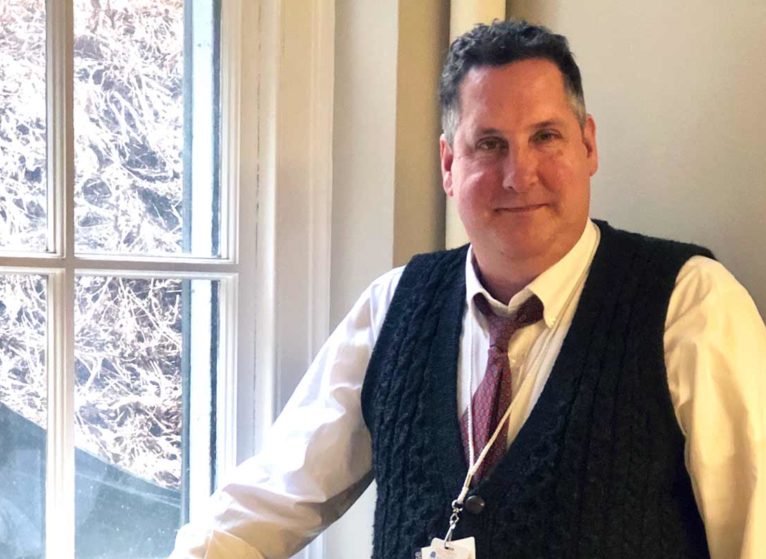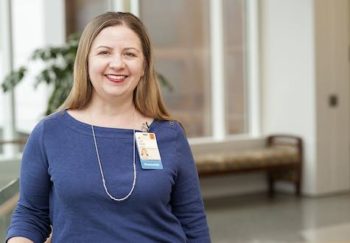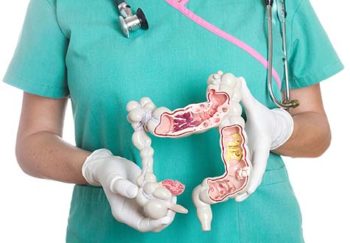Jonathan Bartels, RN, contributed this post. He’s a UVA palliative care nurse and part of the School of Nursing’s Compassionate Care Initiative. He had colon cancer surgery last year.
The first time I was concerned about my health was when I had to run to catch the city bus. I am not in the best shape (after recovering from 2 broken feet last year!), but a little jog should not make me so short of breath that I was gasping. But that’s what happened. As any fine 50-year-old man does, I ignored that little episode.
A few months later I decided to walk to work from home. I used to do that walk everyday a few years ago, and it is literally uphill both ways. As I tried to walk briskly up the first hill, I started to feel lightheaded and dizzy. My breathing and effort to breathe steadily increased, as if I was walking at some high Himalayan elevation.
By the time I reached the top of the hill, I felt like I was going to pass out. I bent over like you see with marathon runners and stood up spreading my arms to catch my breath. I then proceeded to work at a much more controlled pace. At that point I realized that I was indeed in poor physical shape, but there was something else going on.
Lynch Syndrome and my Colon Cancer Family History
I made an appointment and saw my primary care doctor here at UVA, who is also a friend. On my “Reason to see Physician Today” question, I jokingly answered, “I’m dying; tell me why.”
My doctor did a thorough workup — labs, X-ray, physical. Most of the results came back normal, except my oxygen-carrying hemoglobin was low. I had more tests and fewer answers. We finally decided to get a scope and see if I had an upper gastrointestinal (GI) bleed.
At that point, I decided to ask for a colonoscopy. I have an extensive family history of colon cancer. I recalled that my sister did a new gene analysis 20 years ago and was found to have a colon cancer gene (Lynch syndrome).
She warned me and my other five siblings that we should be vigilant in regards to colon cancer. I got a colonoscopy at 31 just to abate my family’s fears. I was clean so my male logic reared its wisdom. I ignored the recommendations for further frequent scopes. Now I was going to check.
A few weeks later I went into the endoscopy suite, still confident the source of my bleeding was something minor. We all know denial is not just a river in Egypt. After I woke up post anesthesia, the GI fellow informed me that I did in fact have cancer.
It was like someone had torn the rug out from beneath my feet. I had no ground to stand on and no place to hold. As an expert in palliative care, helping people cope with serious illnesses, my mind raced into the scenarios I see daily. I was going to die.
Colon Cancer Surgery: Removing My “Tumor Baby”
I was blessed that one of my favorite GI surgeons looked at my scope and tumor. I also called on an oncologist friend at UVA to be my cancer doctor if I needed further treatment.
After the biopsy confirmed my diagnosis and all the scans were complete, my surgeon told me that I had a 6-cm tumor. It was stage 2 colon cancer, identified as Lynch syndrome. The clinic called and let me know I was set up for surgery to remove what I now fondly referred to as my “tumor baby.”
Concerned About Your Colon Cancer Risk?
Talk to your primary care provider about your colorectal cancer screening options.
The day of surgery I was blessed to have not one, but two chaplains, a Christian and a Muslim, offer me, a Buddhist, prayer. I entered the surgical suit and introduced myself and thanked all there. Just prior to the surgery, they honored my request and performed a Pause to honor the covenant I had with them and my surgeon.
Eight hours later, my ‘tumor baby’ and 70% of my colon were gone. The surgeon took much of my colon to minimize my risk of getting cancer again. This led to a lengthy period of adjustment and recovery.
Free From Stage 2 Colon Cancer
Now, many months later, I am cancer-free. My gut has started to adjust and re-acclimate to its new functional status. I’ll follow up yearly with colonoscopies for the next few years. Eventually, I’ll be able to wait 2-3 years. It is all worth it to make sure I will not be caught unaware again.
Two of my four children are now aware that they also have this cancer gene. And I will be alive for much longer than I would have if I had not listened to my body.
So I encourage anyone who will listen — get checked. If you have a family history, be more vigilant. If you have symptoms that cannot easily be explained, see your doctor. My shortness of breath saved my life.



Jonathan, I know that is one baby you do not miss! Thanks for your willingness to share such a personal story. It is just further testament to what a gift YOU are to all of us. I hope everyone who reads your story has a plan to get screened and STAY screened. Colorectal cancer is typically preventable (or can be stopped in its tracks) through adherence to screening. Anyone who has questions about colorectal cancer is welcome to contact me at crcscreening@virginia.edu for assistance and information.
John- as always, your words are life giving!
Jon, thanks for sharing! So glad you are recovering. You are a wonderful person willing to nurse everyone even through your own Illness. Stay strong! Miss you! Nancy